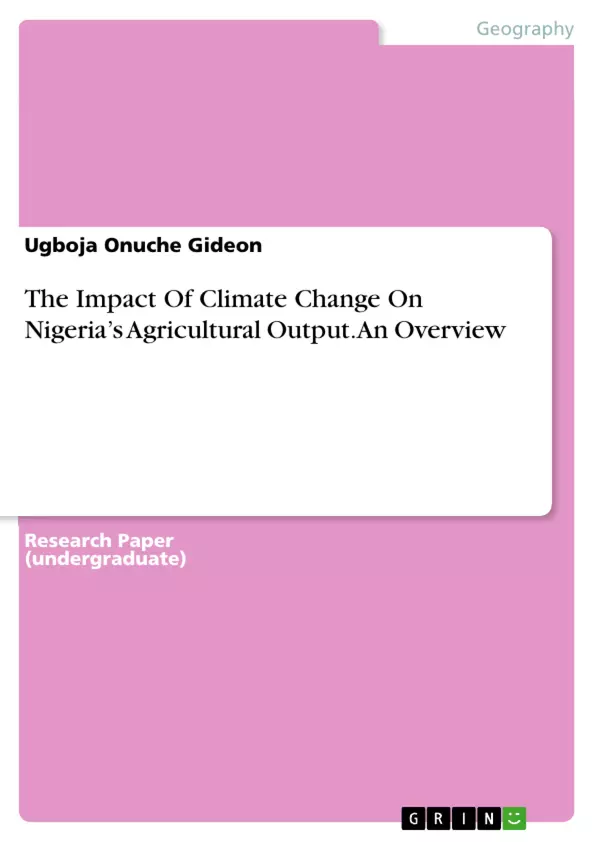This study investigates the impact of climate change on agricultural output in Nigeria economy within the period of 1986 to 2017.
The study employed Autoregressive Distributed Lag Model (ARDL). The study examined the impact of climate change on Nigeria’s agricultural output. Investigated the existence of longrun relationship between climate change and agricultural outputs in Nigeria, examined the direction of causation between climate change and economic growth in Nigeria. From the findings it was discovered that one year lag value of carbon emission is highly significant, and it is positively related to agricultural output in the short run and long run. It was also discovered that one year lag of rainfall is negatively related to agricultural output and it is insignificant. Furthermore, it was also revealed that one year lag of temperature is positively related to agricultural output, meaning there is a positive relationship between agricultural output and temperature in Nigeria.
The study therefore recommended that it is necessary for the government and other relevant authorities to constantly provide information on rainfall distribution ahead of time to help the farmers plan. And also recommended that government should ensure appropriate temperature information most especially there is need that various agricultural output needs to put into consideration.
Table of Contents
- CHAPTER ONE: INTRODUCTION
- 1.1 Background to the Study
- 1.2 Statement of Problem
- 1.3 Research Questions
- 1.4 Objective of the Study
- 1.5 Hypothesis of the Study
- 1.6 Significance of the Study
- 1.7 Scope and Limitation of the Study
- 1.8 Organization of the study
- CHAPTER TWO: LITERATURE REVIEW
- 2.1 Conceptual Literature
- 2.1.1 Climate Change
- 2.1.2 Agriculture
- 2.1.3 Output
- 2.2 Agriculture and the Nigerian Economy
- 2.3 Climatic Condition in Nigeria
- 2.4 Carbon Emission in Nigeria
- 2.5 The Issue of Global Emission and the Nigerian Ecosystem
- 2.6 The Effects of Global Climate Change on Nigeria Agricultural
- 2.7 Theoretical Literature Review
- 2.7.1 Theory Ricardian Cross Section Model
- 2.7.2 Agra-economic Models (Crop Simulation Models)
- 2.7.3 Agro-Ecological Zone (AEZ) Models
- 2.8 Empirical Literature Review
- 2.9 Theoretical framework of Study
- 2.10 Gaps in Literature
- CHAPTER THREE: METHODOLOGY
- 3.1 Types and Sources of Data
- 3.2 Method of Estimation
- 3.3 Model Specification
- 3.4 Evaluation Criteria
- 3.4.1 Unit Root Test
- 3.4.2 Co-integration Test
- 3.4.3 Granger Causality Test
- CHAPTER FOUR: PRESENTATION AND ANALYSIS of DATA
- 4.1 Result Presentation
- 4.1.1 Stationarity Test Result
- 4.1.2Co-integration Test Result(s)
- 4.2 Granger Causality Test Result
- 4.3 Autoregressive Distributed Lag Estimates
- 4.3.1 Bound Test Result
- 4.3.2 Stability Test
- 4.4 Policy Implication of Finding
- CHAPTER FIVE: SUMMARY CONCLUSIONS AND RECOMMENDATIONS
- 5.1 Summary
- 5.2 Conclusion
Objectives and Key Themes
This research aims to investigate the impact of climate change on agricultural output in Nigeria. The study seeks to determine whether climate change has a significant effect on agricultural outputs, establish if a long-run relationship exists between climate change and agricultural outputs in Nigeria, and identify the direction of causation between climate change and economic growth in Nigeria.
- The impact of climate change on agricultural outputs in Nigeria
- The long-run relationship between climate change and agricultural outputs
- The direction of causation between climate change and economic growth in Nigeria
- The significance of climate change to the Nigerian economy
- The role of government policies and international interventions in mitigating climate change impacts on agriculture
Chapter Summaries
Chapter One: Introduction provides a comprehensive background to the study, outlining the significance of agriculture in the Nigerian economy and the growing concerns surrounding climate change. It also presents the statement of the problem, research questions, objectives, hypothesis, significance, scope, and limitations of the study.
Chapter Two: Literature Review delves into the existing knowledge on climate change, its impact on agriculture, and its implications for the Nigerian economy. It covers both conceptual and theoretical literature, highlighting key models and frameworks, as well as empirical studies relevant to the research topic.
Chapter Three: Methodology presents the research methodology used in the study, including the types and sources of data, methods of estimation, model specification, and evaluation criteria. It discusses the statistical tools used to analyze the relationship between climate change and agricultural output.
Chapter Four: Presentation and Analysis of Data presents and analyzes the findings of the study, examining the results of stationarity tests, co-integration tests, Granger causality tests, and autoregressive distributed lag estimates. It also explores the policy implications of the research findings.
Chapter Five: Summary Conclusions and Recommendations summarizes the main conclusions drawn from the study, outlining the impact of climate change on agricultural output in Nigeria. It also provides recommendations for policymakers and stakeholders to address the challenges posed by climate change and promote sustainable agricultural development.
Keywords
The study focuses on the relationship between climate change and agricultural output in Nigeria. Key terms and concepts include climate change, agricultural output, economic growth, sustainability, policy interventions, sustainable development, food security, carbon emissions, and the Nigerian economy.
- Quote paper
- Ugboja Onuche Gideon (Author), 2020, The Impact Of Climate Change On Nigeria’s Agricultural Output. An Overview, Munich, GRIN Verlag, https://www.grin.com/document/984473



